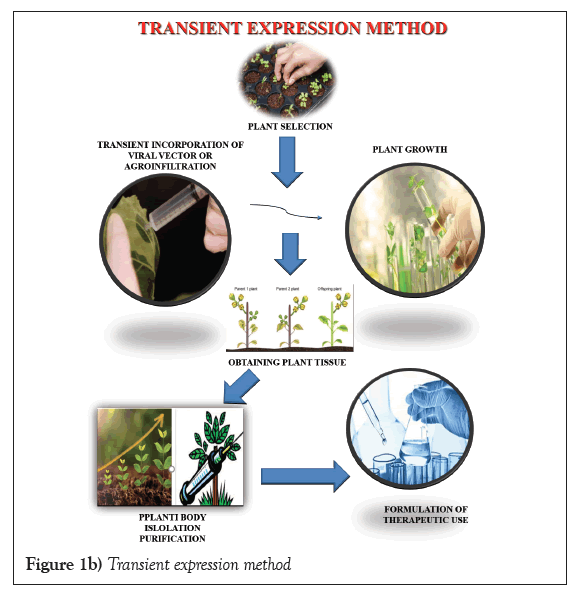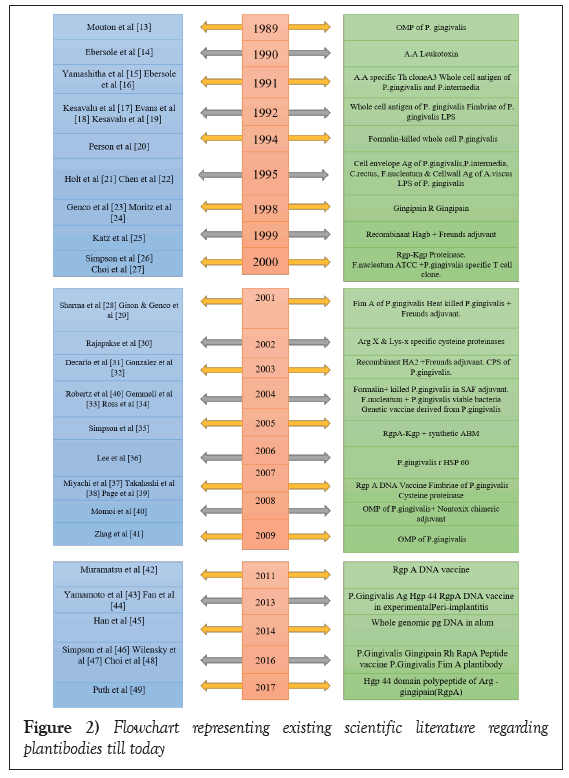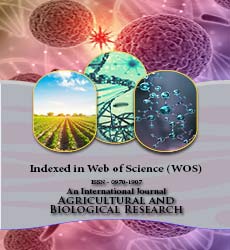Agricultural and Biological Research
RNI # 24/103/2012-R1
Research Article - (2024) Volume 40, Issue 3
Periodontitis, a multifaceted immuno-inflammatory disorder, is intricately linked to systemic conditions such as cardiovascular disease and diabetes mellitus. Recent advancements in cellular and molecular biology have catalyzed the development of innovative vaccination strategies for various viral diseases. The concept of vaccination, pioneered by Edward Jenner in the late 18th century, capitalizes on the phenomenon of acquired immunity following recovery from an illness. Jenner's groundbreaking work with cowpox virus, which conferred cross-protection against smallpox, laid the foundation for modern vaccination practices.
The advent of microbial genome sequencing and bioinformatics has revolutionized our ability to explore the genetic makeup of human pathogens comprehensively. This approach holds promise for identifying novel targets for antimicrobial drugs and vaccines, providing new avenues for combating infectious diseases.
Given the pervasive nature of periodontal disease, there is an imperative need for effective management and prevention strategies. In the realm of immunization, the emergence of plant-based vaccines represents a novel paradigm. This review employed various search engines, including PubMed, Embase, Web of Science, Cochrane, Medline and Google Scholar to identify pertinent articles in medical and dental research. The findings from these studies underscore the potential efficacy of plant-derived vaccines in addressing a diverse range of disorders, including periodontal disease.
This comprehensive review sheds light on the broad spectrum of applications of plant-based vaccines in periodontal care. By harnessing the unique properties of plant-derived antigens, these vaccines hold promise for offering safe, effective and scalable solutions for the prevention and management of periodontitis. Further research and clinical trials are warranted to explore the full potential of plant-based vaccines in revolutionizing periodontal therapeutics.
Periodontal disease; Plant-derived vaccines; Plantibodies; Prevention
Plantibodies, genetically engineered antibodies produced by plants with animal Deoxyribonucleic Acid (DNA) encoding specific human antibodies, offer promising therapeutic potential. These antibodies, capable of neutralizing pathogens or toxins, can be purified and administered for therapeutic or prophylactic purposes. The term "plantibody" and its concept are registered with Biolex, marking a significant advancement in biotechnology [1,2].
Production
The production of plantibodies involves inserting antibody-coding genes into transgenic plants, where intrinsic plant mechanisms modify them. These plant bodies are then purified from plant tissues through mechanical destruction and denaturation. Utilizing protein A resins, antibodies are further purified. Compared to in vitro animal cell cultivation, antibody production in transgenic plants like Nicotiana species is both cost-effective and safer [3].
Benefits
The benefits of transgenic plants in producing antibodies are manifold and extend across various domains, encompassing human health, environmental sustainability and economic viability [4-6].
Human health advancements: Transgenic plants provide a reliable and scalable platform for the production of antibodies, which are essential in combating a wide array of diseases and medical conditions. By harnessing the natural processes of plant growth, researchers can generate significant quantities of therapeutic antibodies, facilitating access to vital treatments for patients worldwide.
Enhanced plant protection: The utilization of transgenic plants for antibody production not only benefits human health but also contributes to plant protection and agricultural sustainability. By engineering plants to produce antibodies against specific pathogens or pests, farmers can reduce reliance on chemical pesticides and mitigate crop losses due to diseases, thereby promoting sustainable agriculture practices.
Economic efficiency: The mass production of antibodies through transgenic plants offers economic advantages over traditional methods. Plants are highly efficient biological factories capable of producing large quantities of proteins at relatively low cost. This scalability and cost-effectiveness make plant-based antibody production economically viable, enabling broader accessibility to essential medical treatments at affordable prices.
Seed abundance and storage: Transgenic plants typically produce abundant seeds, which serve as a convenient and cost-effective means of storing antibody-producing genetic material. Unlike cell culture-based production methods, which require specialized facilities and ongoing maintenance, seeds can be easily stored and transported, simplifying distribution logistics and ensuring long-term availability of antibody-producing plant varieties.
Reduced disease transmission risk: Plant-based antibody production offers a safer alternative to animal-derived antibodies, reducing the risk of disease transmission to humans. Unlike animal-based systems, which may harbor infectious agents or contaminants, transgenic plants provide a controlled and sterile environment for antibody production, minimizing the potential for cross-species transmission of pathogens.
Environmental sustainability: By reducing the reliance on animal-based antibody production methods, transgenic plants contribute to environmental sustainability by mitigating the environmental impacts associated with intensive animal farming practices. Furthermore, the adoption of plant-based antibody production can help conserve natural resources and reduce greenhouse gas emissions associated with livestock agriculture.
The utilization of transgenic plants for antibody production represents a transformative approach with far-reaching benefits for human health, plant protection and economic development. By leveraging the inherent capabilities of plants as bioreactors, researchers can address pressing healthcare challenges while promoting environmental sustainability and economic resilience.
Medical
The utilization of plants for antibody production in medical applications represents a groundbreaking approach with significant implications for treating a myriad of illnesses, ranging from immune disorders to cancer and inflammatory diseases. This innovative strategy leverages the unique attributes of plants to address key challenges in traditional antibody production methods, offering distinct advantages in terms of safety, cost-effectiveness and scalability [7].
Enhanced safety profile: One of the primary reasons for harnessing plants in antibody production is the inherently lower risk of pathogen transmission compared to animal-based systems. Plant bodies provide a controlled and sterile environment for antibody synthesis, minimizing the potential for contamination by infectious agents. This reduces the risk of adverse reactions or infections in patients receiving plant-derived antibodies, enhancing the safety profile of these therapeutic interventions.
Cost-effectiveness and accessibility: Plant-based antibody production offers a cost-effective alternative to conventional methods, making vital medical treatments more accessible to a broader population. The availability of plant materials, coupled with advances in genetic engineering techniques, enables the construction of antibody-producing plant bodies at a fraction of the cost associated with traditional cell culture-based approaches. This affordability enhances the affordability of antibody-based therapies, particularly in resource-limited settings where access to expensive treatments may be limited.
Ease of construction and manipulation: Plants offer a versatile platform for antibody production, characterized by ease of construction and manipulation of genetic information. Advances in biotechnology have facilitated the engineering of transgenic plants capable of synthesizing specific antibodies with high efficiency. Crops such as potatoes, soybeans, alfalfa, rice, wheat and tobacco serve as ideal hosts for antibody production, owing to their abundant biomass and amenability to genetic modification. This flexibility enables researchers to tailor plant-based antibody production systems to meet diverse medical needs effectively.
Commercial viability: The commercial viability of plant-based antibody production solutions further underscores their utility in medical applications. Commercial entities have recognized the potential of plant-derived antibodies as safe and effective therapeutic agents, investing in the development and commercialization of plant-based antibody products.
These commercial solutions not only facilitate the widespread adoption of plant-derived antibodies but also spur innovation and research in the field, driving further advancements in plant biotechnology and therapeutic antibody development. Utilization of plants for antibody production in medical applications offers a compelling solution to address key challenges in traditional antibody production methods. By harnessing the unique advantages of plants, including their safety, cost-effectiveness and ease of manipulation, researchers can develop innovative antibody-based therapies with the potential to revolutionize the treatment of various diseases and improve patient outcomes.
History
Plant-based vaccinations represent a cutting-edge approach to immunization, leveraging molecular biology techniques to engineer transgenic plants capable of producing antigens or antibodies. This innovative method involves the deliberate alteration of plant DNA through the insertion of desired genes using advanced genetic engineering techniques [8,9].
The term "Trans Gene" is coined to denote the inserted gene sequence responsible for encoding the desired antigen or antibody. Depending on the method of insertion and integration, transgenes can be introduced into plant cells using either a stable or transient transformation mechanism. The identification of the first transgenic plant in 1983 marked a significant milestone in biotechnology, paving the way for further advancements in plant-based vaccine development.
Consistent transformation method: Stable transformation involves the integration of the transgene into the genome of host plant cells, resulting in stable genetic modifications. This process, known as nuclear integration, leads to irreversible changes in the genetics of the recipient cell. Studies have shown that stably transgenic plant cells can produce significant amounts of antigen, ranging from 0.01 to 0.430% of total soluble plant protein.
Transient transformation approach: In contrast, transient transformation entails the temporary presence of the transgene in host cells, without integration into the plant's DNA. This method does not require the regeneration of the entire plant and occurs more frequently. Plants utilize their endomembrane and secretory systems to produce large quantities of therapeutically viable proteins, which can be isolated from plant tissue later. This approach enables the rapid production of plantibodies, encompassing various types of antibody molecules, from antigen-binding domains to full-length or multimeric antibodies.
Overall, plant-based vaccinations offer a versatile and scalable platform for antigen and antibody production, with potential applications in preventive and therapeutic medicine. By harnessing the natural biosynthetic pathways of plants, researchers can overcome the limitations of traditional vaccine production methods and develop innovative solutions to combat infectious diseases and other medical conditions.
Figures 1a and 1b depicts the steps involved in obtaining plant-derived vaccines.

Figure 1a: Stable transformation method.

Figure 1b: Transient expression method.
Scope in dentistry
Due to the widespread prevalence of dental illnesses, the urgency for dental vaccines has become increasingly apparent. Vaccines designed to enhance host resistance can offer significant benefits, particularly for individuals vulnerable to extensive periodontal damage, such as those with compromised immune systems. The advent of plant-based vaccines, also known as plantibodies, has heralded a new era in dental immunization. However, research on the utilization of plant-based vaccines to address dental disorders remains limited (Figure 2).

Figure 2: Flowchart representing existing scientific literature regarding plantibodies till today.
Caries in dentistry: Presently, two plant-based vaccines for dental caries are undergoing investigation: CaroRx and Guy's Plantibody. These plantibodies, selectively binding to Streptococcus mutans, are produced from transgenic tobacco plants, thereby inhibiting bacterial adherence to salivary agglutinin [10,11].
Periodontitis: The concept of periodontal vaccination emerged in the 1980s, aiming to manage the most detrimental pathogen, Porphyromonas gingivalis, a keystone pathogen in periodontitis. Consequently, research in this field has predominantly focused on evaluating various vaccinations to control this pathogen. These vaccines target outer membrane proteins derived from P. gingipains, fimbriae and heat shock proteins, affecting the entire cell. While active vaccination protocols have been the primary focus, passive immunization remains relatively overlooked in periodontics. Plantibodies have garnered attention for their potential in developing suitable periodontal vaccines [12-46].
In a study by Choi et al., [45], anti-fimA plantibody was investigated as a potential vaccination candidate for preventing progressive periodontal disease induced by P. gingivalis. The study demonstrated that the anti-fimA plantibodies, produced through the cultivation of rice cell suspension, inhibit the bioactive effects of P. gingivalis on bacterial cells, suggesting their efficacy as a preventive measure [47].
Periodontitis represents a multifaceted pathological condition influenced by a diverse array of factors, with microbial pathogens playing a pivotal role in its etiology. Vaccination emerges as a compelling strategy aimed at augmenting the host's immune defenses against periodontal infections. These plant-derived antibodies exhibit unique characteristics that render them particularly suitable for inclusion in periodontal vaccination strategies. Through their ability to specifically target microbial antigens and modulate immune pathways, plantibodies offer a tailored approach to combating periodontal pathogens and regulating inflammatory responses.
In summary, the integration of plantibodies into periodontal vaccines represents a promising avenue for advancing periodontal therapeutics. Through continued research and development, plantibody-based vaccines have the potential to transform the landscape of periodontal care, offering new possibilities for disease prevention, management and treatment.
While in vitro and animal studies have shown promising therapeutic efficacy of plant-derived vaccines, several obstacles hinder their widespread adoption. Challenges include the selection of suitable plants, identification of virulent antigens, formulation of therapeutic doses and compliance with World Health Organizations (WHO's) good manufacturing practices procedures. Despite preliminary research indicating their advantages, plantibodies have yet to be licensed for human ingestion due to these hurdles.
[Crossref] [Google Scholar] [PubMed]
[Crossref] [Google Scholar] [PubMed]
[Crossref] [Google Scholar] [PubMed]
[Crossref] [Google Scholar] [PubMed]
[Crossref] [Google Scholar] [PubMed]
[Crossref] [Google Scholar] [PubMed]
[Crossref] [Google Scholar] [PubMed]
[Crossref] [Google Scholar] [PubMed]
[Crossref] [Google Scholar] [PubMed]
[Crossref] [Google Scholar] [PubMed]
[Crossref] [Google Scholar] [PubMed]
[Crossref] [Google Scholar] [PubMed]
[Crossref] [Google Scholar] [PubMed]
[Crossref] [Google Scholar] [PubMed]
[Crossref] [Google Scholar] [PubMed]
[Crossref] [Google Scholar] [PubMed]
[Crossref] [Google Scholar] [PubMed]
[Crossref] [Google Scholar] [PubMed]
[Crossref] [Google Scholar] [PubMed]
[Crossref] [Google Scholar] [PubMed]
[Crossref] [Google Scholar] [PubMed]
[Crossref] [Google Scholar] [PubMed]
[Crossref] [Google Scholar] [PubMed]
[Crossref] [Google Scholar] [PubMed]
[Crossref] [Google Scholar] [PubMed]
[Crossref] [Google Scholar] [PubMed]
[Crossref] [Google Scholar] [PubMed]
[Crossref] [Google Scholar] [PubMed]
[Crossref] [Google Scholar] [PubMed]
[Crossref] [Google Scholar] [PubMed]
[Crossref] [Google Scholar] [PubMed]
[Crossref] [Google Scholar] [PubMed]
[Crossref] [Google Scholar] [PubMed]
[Crossref] [Google Scholar] [PubMed]
[Crossref] [Google Scholar] [PubMed]
[Crossref] [Google Scholar] [PubMed]
[Crossref] [Google Scholar] [PubMed]
[Crossref] [Google Scholar] [PubMed]
[Crossref] [Google Scholar] [PubMed]
[Crossref] [Google Scholar] [PubMed]
[Crossref] [Google Scholar] [PubMed]
[Crossref] [Google Scholar] [PubMed]
[Crossref] [Google Scholar] [PubMed]
[Crossref] [Google Scholar] [PubMed]
Citation: Vinayaka AM, Chaya AM, Choudhary A, et al. Periodontal vaccines via plantibodies: Bridging the gap between aspiration and achievement. AGBIR.2024;40(3):1046-1049.
Received: 04-Mar-2024, Manuscript No. AGBIR-24-128779; , Pre QC No. AGBIR-24-128779 (PQ); Editor assigned: 07-Mar-2024, Pre QC No. AGBIR-24-128779 (PQ); Reviewed: 22-Mar-2024, QC No. AGBIR-24-128779; Revised: 29-Mar-2024, Manuscript No. AGBIR-24-128779 (R); Published: 05-Apr-2024, DOI: 10.35248/0970-1907.24.40.1046-1049
Copyright: This open-access article is distributed under the terms of the Creative Commons Attribution Non-Commercial License (CC BY-NC) (http:// creativecommons.org/licenses/by-nc/4.0/), which permits reuse, distribution and reproduction of the article, provided that the original work is properly cited and the reuse is restricted to noncommercial purposes. For commercial reuse, contact reprints@pulsus.com This is an open access article distributed under the terms of the Creative Commons Attribution License, which permits unrestricted use, distribution, and reproduction in any medium, provided the original work is properly cited.
